Last week a jury found Derek Chauvin guilty of murdering George Floyd. With that verdict, the trial of one police officer came to an end and a renewed conversation about policing in America and use of excessive force has begun.
It’s something I’ve explored from all perspectives, as a psychologist whose expertise lies in the development and management of aggressive behavior, especially in high-risk environments. Several years ago, my team was awarded funding from the U.S. Department of Justice to work with state and federal agencies and the police department of a large municipality to help come up with a plan to reduce violent crime. As part of our process, we went on a “ride along” with a street crimes unit. We were given bulletproof vests to wear and shown a one-way street used by a local gang to protect their territory, where the positions of houses and direction of traffic made it easy to target and fire on enemies. In another area, we were shown the pleasant, well-maintained plaza of a public housing community where drugs were bought and sold in full view of a children’s playground.
The experience reinforced what we suspected: The dangers faced by police officers are very real, and the conditions under which some officers work are stressful and anxiety provoking. At times, then are even traumatizing.
But my research has also uncovered a huge mental health toll that violence has among children, adolescents, and adults living in communities marked by violent crime and ethnic-political conflict. Exposure to violence is frequently linked to depression, anxiety, substance use, or other indicators of psychological distress.
But though their lives are plagued by violence, people in these communities also are concerned about negative encounters with the police. Especially in urban communities where many of my studies have been conducted, experiences with and beliefs about the police are often a double-sided coin: Residents appreciate the safety and service that police often can provide, but fear and resent the dangers that exchanges with police sometimes can represent.
In other words, policing in the communities that most need it is a double-edged sword. When police engage in the inappropriate use of force, they are compounding the violence that vulnerable people in these communities already face. And this is true even though many use-of-force incidents are due to a relatively small handful of officers who have significant problems with anger and stress.
Nathan Howard/Getty Images
Moreover, as I found in my recently released report on the inappropriate use of force by police, much of this inappropriate use of force can be linked to a dramatic increase in the militarization of American police departments in terms of weaponry and tactics. Our research duplicated decades of findings on the “weapons effect”—exposure to weapons and especially guns increase aggressiveness across-the-board.
The disproportionate use of force by police against minority groups is in line with research on implicit biases against and the dehumanization of racial and ethnic minorities as well as studies demonstrating the broad impact of systemic racism across multiple sectors of everyday life, including health and education.
We also found that even large scale efforts to reduce the inappropriate use of force by police have by and large not been very effective.
Our report offers five recommendations for policymakers, law enforcement officials, and scholars:
- Implement public policies that can reduce inappropriate use of force directly and through the reduction of broader burdens on the routine activities of police officers.
- For officers frequently engaged in use-of-force incidents, ensure that best-practice, evidence-based treatments are available and required.
- Improve and increase the quality and delivery of non-coercive conflict resolution training for all officers, along with police administrative policies and supervision that support alternatives to the use of force, both while scaling back the militarization of police departments.
- Continue the development and evaluation of multi-component interventions for police departments, but ensure they incorporate evidence-based, field-tested components.
- Expand research in the behavioral and social sciences aimed at understanding and managing use-of-force by police and reducing its disproportionate impact on minority communities and expand funding for these lines of inquiry.
With the verdict against Floyd’s killer, we are clearly at a watershed moment for police and they communities they serve. Our hope in presenting our report is that this moment will yield a constructive outlook, moving towards safety and well-being for all.
Paul Boxer is Professor of Psychology at Rutgers University in Newark, NJ. His research focuses on the development and management of aggressive and violent behavior as well as evidence-based practices in the justice system.
The views in this article are the writer’s own.

